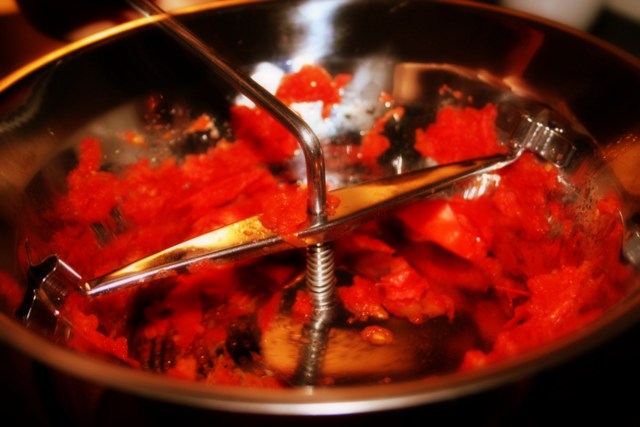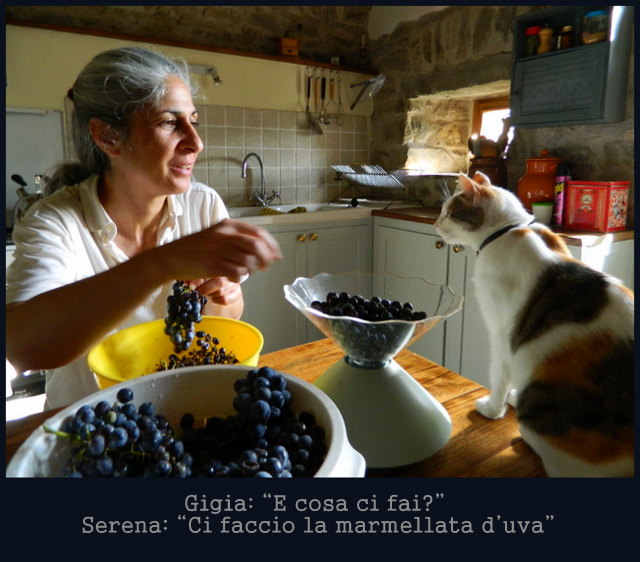Gigia And The Grape Jam Posted by Serena on Oct 9, 2015 in Italian Language
The setting: Geoff and Serena’s kitchen.
The characters: Serena and Gigia the cat.
Gigia, seduta sul tavolo della cucina mentre osserva Serena al lavoro con pentole, bilancia, colapasta e uva, tanta uva: “Questa è l’uva che tu e Geoff avete raccolto stamattina sull’orto?”
Gigia, sitting on the kitchen table whilst observing Serena at work with saucepans, scales, colander and grapes, a lot of grapes: “Are these the grapes that you and Geoff picked this morning up on the allotment?”
Serena: “Sì, esatto”
Serena: “Yes, exactly”
Gigia: “E cosa ci fai?”
Gigia: “What will you do with them?”
Serena: “Ci faccio la marmellata d’uva”
Serena: “I’m going to make grape jam”
Gigia: “Come fai a farla?”
Gigia: “How do you make it?”
Serena: “Beh, intanto ho lavato i grappoli d’uva e li ho messi nel colapasta a scolare. Ora scelgo gli acini che non sono rovinati e li stacco dal grappolo per farci la marmellata”
Serena: “Well, I’ve already washed the bunches of grapes and put them in the colander to drain. Now I’m choosing the grapes that aren’t ruined and removing them from the bunches to use them for the jam”
Gigia: “Perché li metti nella bilancia?”
Gigia: “Why are you putting them on the scales?”
Serena: “Perché devo sapere il peso esatto degli acini d’uva, così da calcolare la quantità di zucchero che mi serve”
Serena: “Because I must know the exact weight of the grapes in order to calculate the quantity of sugar I’ll need”
Gigia: “Dopo che li hai pesati cosa fai?”
Gigia: “After you’ve weighed them what will you do?”
Serena: “Dopo averli pesati li metto in una pentola molto grande, li porto a bollore e li faccio cuocere per una mezz’oretta”
Serna “After having weighed them I’ll put them in a big saucepan, bring them to the boil and then I’ll let them cook for about half an hour”
Gigia: “Poi ci aggiungi lo zucchero?”
Gigia: “Then you add sugar?”
Serena: “No, prima li faccio raffreddare un po’ e poi li passo al passaverdura per eliminare i semi”
Serena: “No, first I let them cool down a little, and then I sieve them with the vegetable mill to remove the seeds”
Gigia: “Che cos’è il passaverdura?”
Gigia: “What’s the vegetable mill?”
Serena: “E’ un attrezzo molto utile che si usa per fare cose tipo minestre vellutate, salsa di pomodoro e così via, perché schiaccia le verdure e allo stesso tempo elimina semi e bucce”
Serena: “It’s a very useful tool used to make things like creamy soups, tomato sauces, and so on, because it mashes the vegetables and also removes the seeds and peel”

Il passaverdura è un attrezzo molto utile che si usa per fare cose tipo minestre vellutate, salsa di pomodoro e così via …
Gigia: “Va bene, e a questo punto …?”
Gigia: “OK, and now …?”
Serena: “A questo punto rimetto il purè d’uva nella pentola, lo porto a bollore, ci aggiungo lo zucchero, il succo e la buccia di limone grattugiata e faccio bollire senza coperchio finché non ha raggiunto la giusta consistenza”
Serena: “Now I put the mashed grapes back in the saucepan, bring them to boiling point, add sugar, lemon juice and grated rind, and let it boil without a lid until it reaches the right consistency”
Gigia: “Quanto zucchero e quanto limone ci metti?”
Gigia: “How much sugar and lemon do you add?”
Serena: “Per ogni chilo di acini d’uva ci metto quattrocento grammi di zucchero e il succo e la buccia di mezzo limone non trattato”
Serena: “For each kilo of cleaned grapes I add four hundred grams of sugar and the juice and rind of half an untreated lemon”
Gigia: “E per quanto tempo la fai bollire?”
Gigia: “How long do you boil it for?”
Serena: “La marmellata d’uva ci mette parecchio ad addensarsi, circa un paio d’ore. Bisogna stare attenti a non farla attaccare”
Serena: “Grape jam takes a long time to thicken, about a couple of hours. You must be careful not to let it stick to the pan”
Gigia: “Poi immagino che la invasi come tutte le altre marmellate”
Gigia: “Then I imagine you bottle it like all the other jams”
Serena: “Sì, la verso nei barattoli puliti come al solito. Però la lascio riposare per almeno un paio di settimane prima di mangiarla, perché la marmellata d’uva ci mette un po’ di tempo ad addensarsi. Più resta lì e più diventa dura. Però si mantiene bene a lungo, anche dopo due anni è ancora ottima”
Serena: “Yes, I pour it into clean jars as usual. But I leave it to settle for at least a couple of weeks before eating it, because grape jam takes some time to set. The longer you leave it the harder it becomes. However it keeps well for a long time, even after two years it’s still very good”
Gigia: “Tanto lavoro solo per mangiare qualcosa! Voi umani proprio non vi capisco: io preferisco mangiarmi un bel fegatino di topo fresco che è pronto in un attimo.”
Gigia: “So much work just to eat something! I really can’t understand you humans: I’d rather eat a fresh mouse liver, which is ready in an instant.”
Serena: “Allora vattene a caccia!”
Serena: “Off you go hunting then!”
Ciao ciao … Miao miao …

Build vocabulary, practice pronunciation, and more with Transparent Language Online. Available anytime, anywhere, on any device.






Comments:
Elaine:
Bellissimo racconto, come sempre. Ma potete spiegarte la differenza fra UVA e ACINO, e perché si usa UVA (singolare) per dire “grapes” (plurale)? Quando si direbbe “uve”?
Serena:
@Elaine Salve Elaine! Salve Laurel!
Allora, UVA in italiano è singolare colettivo e indica tutto l’insieme. ACINO è il singolo chicco di uva che forma poi il grapppolo. UVE, plurale, è solo usato in maniera tecnica quando si parla delle varie qualità di uva usate per fare il vino.
Spero di essere stata chiara.
Saluti da Serena
AnnK:
Racconto carino Serena. Può spiegare la frase ” e faccio bollire senza coperchio finche` NON HA RAGGIUNTO la giusta consistenza”. Perché si sceglierebbe il passato prossimo invece del tempo presente, ‘finche raggiunge la giusta consistenza’? C’e` una differenza? Grazie!
Serena:
@AnnK Salve Ann!
‘Finché’ significa ‘per tutto il tempo che’ = ‘as long as’, mentre ‘finché non’ è un falso negativo e significa ‘fino a quando (non)’ = ‘until’, e.g. ‘finché piove non possiamo uscire’ oppure ‘finché non smette di piovere non possiamo uscire’. Vedi questo articolo: https://blogs.transparent.com/italian/finch-o-finch-non/
Per quanto riguarda il passato prossimo, ‘finché non ha raggiunto’, è un uso della lingua parlata, che sostituisce il più comune passato prossimo al meno comune futuro anteriore, i.e. ‘finché non avrà raggiunto’
Spero di essere stata chiara
Saluti da Serena
Lesley:
Serena
Un sacco di uva!!
‘Ci’ I understand it means ‘us’ or ‘there’ but I see in your story it also means ‘with them’? As in ‘cosa ci fai’
Serena:
@Lesley Salve Lesley!
‘Ci’ is used a lot in Italian with different meanings. In this particular case, ‘Cosa ci fai?’, ‘ci’ substitutes the words ‘con l’uva’, i.e. ‘cosa fai con l’uva?’ = ‘cosa ci fai?’
You can find some uses of ‘ci’ in this old article: https://blogs.transparent.com/italian/tricky-little-words-%E2%80%9Cci%E2%80%9D/.
Saluti da Serena
Linda Caston:
Grazie. Mi sono divertata
Serena:
@Linda Caston Grazie Linda!
Laurel Barton:
Gigia sembra la mia gatta tre colore che si chiama LibbyJean! Non capisco il termine “acino d’uva.” Non e’ un po’ ridondante? Quando si usa “acino” invece “uva?”